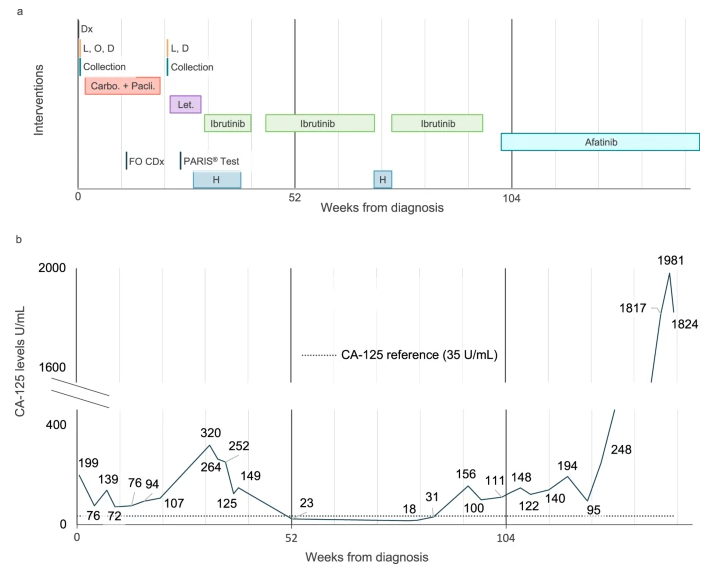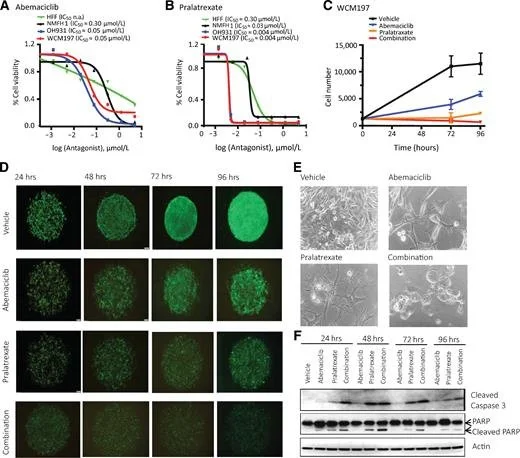Title
Journal
Description
Functional precision medicine: Uncovering high actionability in rare cancers beyond genomics
The PARIS® ex-vivo drug sensitivity test enables identification of effective targeted therapies for rare cancers, often uncovering actionable treatment options beyond standard genomic profiling and providing durable clinical benefit even in the absence of known biomarkers.
Association between ex vivo pharmacotyping of patient-derived tumor organoids and personalized therapeutic options for patients with biliary tract cancer.
This study demonstrates that ex vivo drug sensitivity testing of patient-derived tumor organoids using the PARIS® assay can identify individualized and effective targeted therapies for biliary tract cancer patients—often after standard treatments have failed—highlighting the potential of this approach to guide treatment selection and improve outcomes in this challenging disease.
Ex vivo drug testing identifies a potentially effective drug in 94% of cases for 403 patients in 42 tumor types
A CLIA-certified functional assay (the PARIS® test) using patient-derived tumor cells from a wide variety of solid tumors successfully identified individualized drug sensitivities—including for rare and drug-resistant cancers—demonstrating the feasibility and clinical utility of this approach to guide personalized cancer therapy.
Case report: ex vivo tumor organoid drug testing identifies therapeutic options for stage IV ovarian carcinoma
This case report highlights how ex vivo drug sensitivity testing enabled a patient with advanced, treatment-resistant ovarian cancer to achieve stable disease with a personalized therapy, demonstrating the promise of functional precision medicine when standard treatments fail.
Tumor organoid based drug sensitivity testing in ovarian cancer identifies exceptional responders to targeted therapies
The PARIS® organoid-based drug sensitivity assay is a feasible and clinically useful tool for identifying personalized and effective therapies for ovarian cancer patients, leading to exceptional responses—including in advanced, treatment-resistant cases—by guiding oncologists in selecting targeted treatments.
Complete Remission of Widely Metastatic Human Epidermal Growth Factor Receptor 2–Amplified Pancreatic Adenocarcinoma After Precision Immune and Targeted Therapy With Description of Sequencing and Organoid Correlates
A patient with HER2-overexpressing pancreatic ductal adenocarcinoma achieved a durable complete clinical response following combination therapy with anti-HER2 agents, immunotherapy, and radiation, with organoid and immune studies suggesting contributions from both targeted and vaccine treatments to the remission.
Extraordinary clinical response to ibrutinib in low-grade ovarian cancer guided by organoid drug testing
A patient with advanced, platinum-resistant low-grade serous ovarian cancer experienced a dramatic and sustained clinical improvement after ex vivo drug sensitivity testing of tumor-derived organoids identified effective off-label targeted therapies, demonstrating the potential of functional precision medicine for patients unresponsive to standard treatments.
A Functional Precision Oncology Approach to Identify Treatment Strategies for Myxofibrosarcoma Patients
By combining comprehensive genomic profiling with high-throughput drug screening, this study identified and validated tumor-specific drug sensitivities—particularly to cell cycle inhibitors—in a patient with high-grade myxofibrosarcoma, demonstrating the value of functional precision oncology for rare tumor types.
For the right cancer medicine, ask the tumor. Seattle’s SEngine is using patient tumor samples to derive cancer organoids for accurate ex vivo drug testing, target identification and drug development.
Although many people think of cancer as a single disease, in reality, it is a collection of many different diseases. Each patient’s cancer is a unique mosaic of genetic and epigenetic alterations, which is why it has been a challenge to identify the right course of therapies for each patient.
A cancer organogram test as a guide for oncology treatments in SOLID tumors: An analysis of 628 tests in 419 patients, Astrid Margossian et al.
This study demonstrates a strong clinical prediction of the “cancer organogram” for targeted and chemotherapeutic agents. The organogram guided selection of therapeutics for a significant subset of cancer patients, nearly 4 times the rate reported with genomic testing alone.
Functional drug screening of organoids from ovarian cancer patients demonstrates clinical and genomic concordance and identifies novel therapeutic vulnerabilities, Goldie Lui et al.
The genomic/histopathological heterogeneity and unique patterns of drug responses across cancer patients highlight the need to individualize therapy. This study data demonstrates the utility of organoid based drug screening to nominate therapeutic options for individual patients with or without known genomic biomarkers.
Targeting BET Proteins BRD2 and BRD3 in Combination with PI3K-AKT Inhibition as a Therapeutic Strategy for Ovarian Clear Cell Carcinoma, Shogo Shigeta et al.
This study identifies novel drug targets and combinations to combat ovarian clear cell carcinoma (OCCC). Co-authored by researchers from the Fred Hutchinson Cancer Research Center, SEngine Precision Medicine, Weill Cornell Medicine, and the University of Washington.
BET, SRC, and BCL2 family inhibitors are synergistic drug combinations with PARP inhibitors in ovarian cancer, Goldie Lui et al.
This study shows conditional high-throughput siRNA and drug screening of ovarian cancer PDCs that faithfully recapitulate patient tumour genetics and biology to identify and prioritize effective target and drug combinations with PARPi for HGSC and OCCC.
Organoid based functional test to predict personalized treatment in cholangiocarcinoma, Franz X. Schaub et al.
This study shows the feasibility of functional testing of organoids derived from cholangiocarcinoma patients in a CLIA certified diagnostic test.
Organoid based functional test to predict personalized treatment in cholangiocarcinoma, Astrid Margossian, Carla Grandori et al.
This study shows the potential clinical utility of high throughput pharmacogenomic profiling of organoids derived from patients with cholangiocarcinoma in a CLIA certified diagnostic test.
Predictive value of a CLIA approved organoid based drug sensitivity test, Astrid Margossian, Carla Grandori et al.
This study shows the strong concordance with genomic and retrospective clinical evidence of CLIA certified pharmacogenomic profiling of organoids derived from patients with a range of solid tumors.
Clinical and genomic correlation of a CLIA certified organoid based functional test in breast cancer patients, Astrid Margossian et al.
This study shows organoid based drug testing exhibits strong concordance with genomic or IHC biomarkers and clinical response.
Medium-throughput drug screening of patient-derived organoids from colorectal peritoneal metastases to direct personalized therapy, Narasimhan et al.
This study demonstrates the feasibility and potential clinical utility of pharmacogenomic profiling of organoids derived from late-stage colorectal cancer patients and identifies potential therapies for a subset of patients with no remaining options.
The Promise of Functional Precision Medicine, Christopher Kemp, Carla Grandori
This invited interview with Drs. Kemp and Grandori describes the techniques, uses and challenges of functional testing to guide precision medicine.
Personalized Cancer Models for Target Discovery and Precision Medicine - A Review, Carla Grandori et al.
This invited review outlines the enormous potential of using patient derived tumor models for target discovery, drug development, cancer biology, and clinical utility.
Patient derived organoids to model rare prostate cancer phenotypes, Puca et al.
This study demonstrates the utility of pharmacogenomic profiling of organoids and identifies potential therapies.
A Phase I Clinical Trial of AZD1775 in Combination With Neoadjuvant Weekly Docetaxel and Cisplatin Before Definitive Therapy in Head and Neck Squamous Cell Carcinoma, Eduardo Mendez et al.
This study describes results of a clinical trial using a targeted WEE1 inhibitor in patients with borderline respectable head and neck cancer. Although this was only a toxicity finding study, nine out ten patients showed an objective response. Further, this study highlights the ability of our drug target discovery platform to drive clinical trials.
Pan-cancer Alterations of the MYC Oncogene and Its Proximal Network across the Cancer Genome Atlas, Franz X. Schaub, et al.
This landmark TCGA study provides the most comprehensive analysis of alterations in the MYC oncogene across all cancers. This resource will guide basic and clinical research, particularly for development of novel therapies to treat MYC driven cancers.
Personalized In Vitro and In Vivo Cancer Models to Guide Precision Medicine, Chantal Pauli et al.
Featured as highlight for this issue and profiled in Nature Medicine and Nature. This study describes the utility of using pharmacogenomic profiling of tumor derived organoids to identify potential therapeutic options. Whole exome sequencing of late-stage cancers identified alterations with a potential matching drug in less than 5% of cases. In contrast, drug profiling found multiple potentially effective drugs for every patient tested, as well as novel drug combinations.
Synthetic lethal screens as a means to understand and treat MYC-driven cancers, Silvia Cermelli et al.
This invited review highlights the use of novel isogenic cell systems and an arrayed siRNA screening platform to identify genes that are synthetic lethal to common human oncogenes.
Functional genomics to identify unforeseen cancer drug targets Chris Kemp et al.
This invited review discusses the potential of unbiased genome scale functional genomic screens to identify novel drug targets.



























